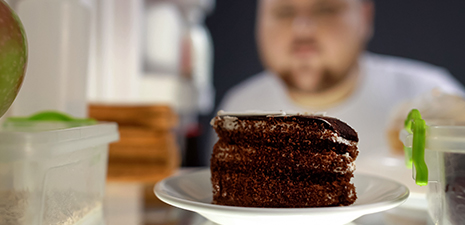What’s the difference between true hunger and fleeting cravings? Learn the science behind food cravings, and how to break free from them, with Nurse Barb Dehn.

The Science Behind Cheat Meals
Many experts advocate periodic cheat meals, but is there any scientific evidence to support indulging in them? In this article, I will highlight the positives and negatives behind cheat meals. You may discover that they do more harm than good.
What Are Cheat Meals?
Cheat meals are any meals made up of foods that will not lead you towards your health or weight-loss goals. The meals are considered a cheat since you are not staying true to your desired eating plan.
A cheat meal may not necessarily be made up of what we consider to be unhealthy foods. The cheat meal may simply be a meal that is in excess or contains only one or two items you consider to be a cheat food. Cheat meals, in general, emphasize the over-consumption of food. The emphasis on overeating is one reason a cheat meal philosophy may not lead you down the right path.
You should also note that cheat meal dieting is not the same as yo-yo dieting. Yo-yo dieting refers to cycling of weight up and down while cheat meal dieting refers to the periodic over-consumption of foods not on your eating plan.
Labeling Food as “Good” or “Bad”
The cheat meal philosophy also emphasizes rewards (“good”) and punishments (“bad”) around diet and exercise. This leads us to shift our focus to healthy foods as being undesirable and the cheat meals being a reward. This focus will not support long-term health or lifestyle changes.
Instead of a focus on punishment for eating a less-healthy food, perhaps you can focus on something positive: how to more mindfully eat the foods that are less healthy. Focus on slowing down and seeing the “unhealthy” foods for what they really are—a source of calories and a satisfying flavor. Perhaps we can learn to appreciate the cheat meal items for what they are and consider these foods acceptable as long as we eat them mindfully.
As weight loss continues, some may look for foods that provide more pleasure. This pleasure-seeking is expected and a normal part of weight loss. However, we want to focus on how to cope with this instead of looking to cheat our way out of success.
Here are 3 ways to cope when seeking pleasure foods:
- Re-create your favorite guilty pleasure food and create a healthy twist to the recipe. For example, if you enjoy fried foods, try baking or using an air-fryer instead. If you love baking and have a sweet tooth, try substituting half the sugar with stevia, or using a fruit substitute like applesauce or mashed banana in the recipe to help sweeten it.
- Share your pleasurable food with a friend! This reduces the portion size, and adds to the fun and experience of eating.
- Follow the ¼ of the plate rule when seeking a pleasure food. Fill no more than ¼ of your plate full of an item that you know will not lead you towards your goals.
What is this alternative to cheat meal dieting? A good lifestyle goal for working on weight loss would be to focus on mindful eating, and not overeating any one meal even if it is considered a cheat meal or less healthy meal to you.
Diet Consistency Is Important
Overall, I like to put the focus on diet consistency. Say it again to yourself, “diet consistency.” This is a positive term to help encourage a focus on eating for your specific weight-loss goal. Continue to remind yourself that you are focusing on eating a certain way to reach your goals every day of the week. If a food that is not the healthiest makes its way into your diet, continue to remind yourself you are working on diet consistency and can eat the less healthy food mindfully. This will help put you on the path to a positive lifestyle change for long-term results.
Lastly, there is also research to support this idea of diet consistency. One research study of over 1000 participants showed that those who had the most consistent diet over the entire week were 1.5 times more likely to be able to maintain their weight loss than those who ate restrictively Monday through Friday and cheated on the weekend.1
Cheat Meals Are Not Supported by Science
In conclusion, there is no scientific evidence to support eating cheat meals for weight loss. In fact, there is some research that shows cheat meal dieting may put a stop to weight loss or even cause weight gain. One small study on overweight adults showed this pattern. The research participants were not able to lose as much weight as those participants who had a consistent diet.2 The study also notes that physical activity played a smaller role than diet change in weight loss.
Furthermore, there is plenty of research that points to switching the focus to more mindful and intuitive eating, and shifting the focus away from punishments around food. So, we can confidently conclude that we should move away from this cheat meal philosophy and continue to work towards mindful eating once and for all.
Rx Only. For the safe and proper use of Plenity or more information, talk to a healthcare professional, read the Patient Instructions for Use.
- Gorin, A. A., S. Phelan, R. R. Wing, and J. O. Hill. 2004. “Promoting Long-Term Weight Control: Does Dieting Consistency Matter?” International Journal of Obesity and Related Metabolic Disorders: Journal of the International Association for the Study of Obesity 28 (2): 278–81. https://doi.org/10.1038/sj.ijo.0802550
- Racette, Susan B., Edward P. Weiss, Kenneth B. Schechtman, Karen Steger-May, Dennis T. Villareal, Kathleen A. Obert, and John O. Holloszy. 2008. “Influence of Weekend Lifestyle Patterns on Body Weight.” Obesity (Silver Spring, Md.) 16 (8): 1826–30. https://doi.org/10.1038/oby.2008.320





